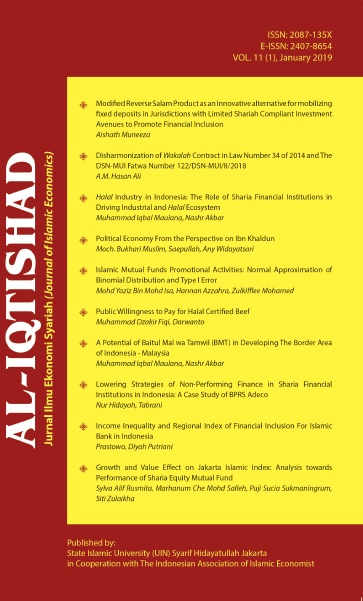Modified Reverse Salam Product as an Innovative alternative for mobilizing fixed deposits in Jurisdictions with Limited Sharia Compliant Investment Avenues to Promote Financial Inclusion
DOI:
https://doi.org/10.15408/aiq.v11i1.7111Keywords:
Deposit, Financial Inclusion, Fintech, Islamic Finance, Salam, Sharia Compliance, ShariaAbstract
With the fintech (financial technology) solutions available in the market today, innovative ways to provide financial inclusion is needed. However, the most critical challenge in the arena is the limited availability of shariacompliant investment avenues in some of the jurisdictions of the world where Islamic banking and finance has not yet fully taken off. The main objective of this research is to introduce a universally accepted mechanism using salam, one of the least used Islamic finance contracts in Islamic commercial banking for mobilizing fixed deposits. This will be ideal to be used in jurisdictions with limited sharia-compliant avenues. This is exploratory legal research that aims to provide an adequate and effective product for the jurisdictions that aspires to have a sophisticated fixed return guaranteed investment products structured in a sharia-compliant manner. Simultaneously, the proposed product in this research will serve the less privileged community of the society whose commodities can be used as an underlying asset in structuring the product. However, this social impact of the product will differ depending on the jurisdiction in which it is applied and the decision of the financial institution in which the product is offered as it is there discretionary power to choose the underlying commodity used in the transaction. Fintech can also be fused with the suggested product, and as such, the product can be easily used by the population in physically remote locations in a convenient manner.
Keberadaan solusi fintech di pasaran saat ini memerlukan adanya inovasi-inovasi untuk mewujudkan keuangan inklusif. Akan tetapi, tantangan yang paling serius dalam hal ini adalah terbatasnya cara investasi yang sesuai dengan syariah di beberapa yurisdiksi di dunia, dimana perbankan dan keuangan syariah belum sepenuhnya diadopsi. Tujuan utama dari penelitian ini adalah memperkenalkan mekanisme yang diterima secara universal dengan menggunakan salam, sebagai salah satu jenis kontrak keuangan yang paling jarang digunakan dalam perbankan komersial syariah untuk memobilisasi deposito dengan pengembalian tetap. Hal ini dapat menjadi ideal digunakan dalam yurisdiksi yang memiliki kesusaian syariah terbatas. Studi ini merupakan penelitian hukum eksploratori yang bertujuan untuk menawarkan produk yang tepat dan efektif bagi yurisdiksi yang berkeinginan untuk memiliki produk investasi terjamin dengan pengembalian tetap yang terstruktur dengan cara yang sesuai dengan syariah. Selain itu, produk yang ditawarkan ini akan dapat dimanfaatkan oleh komunitas yang kurang mampu dengan komoditas yang dapat digunakan sebagai asset dasar dalam penataan produk. Akan tetapi, dampak sosial dari produk ini akan berbeda-beda tergantung pada yuridiksi di mana ia diterapkan dan keputusan lembaga keuangan di mana produk tersebut ditawarkan. Hal ini karena adanya kekuatan diskresi untuk memilih komoditas dasar yang digunakan dalam transaksi. Fintech juga dapat digabungkan dengan produk salam, dan dengan demikian, produk tersebut dapat dengan mudah dimanfaatkan oleh populasi di lokasi-lokasi terpencil.
References
Al- Masri, Rafic Yunus. 2003. “Market price of Salam on the date of delivery: Is it permissible?” J.KAU: Islamic Econ 16(2): 29-32.
Al Suwailem, S. 2006. Hedging in Islamic finance. Jeddah: Islamic Development Bank.
Al Zaabi, Obaid Sai. 2010. “Salam contract in Islamic law: A Survey.” Review of Islamic Economics 14(2): 91-122.
Al-Zuhayli, Wahbah. 2007. Financial transactions in Islamic jurisprudence. Mohamoud A. el-Gamal. trans. Beirut: Dar al-fikir al-Mauaser.
Dchieche, Amina. & Rajae Aboulaich. 2016. “Pricing Bounded Value Based Salam.” Journal of Applied Economics Sciences 11(3): 41-49.
Banerjee, Abhijit & Andrew F. Newman. 1993. “Occupational Choice and The Process of Development.” Journal of Political Economy 101(2): 274-298.
Bank Negara Malaysia. Financial sector blueprint 2011–2020, Retrieved December 31, 2016 from <http://www.bnm.gov.my/files/publication/fsbp/en/ BNM_
FSBP_FULL_en.pdf>
Beck, Thorsten, & Asli Demirguc-Kunt. 2008. “Access to Finance: An Unfinished Agenda.” The World Bank Economic Review 22(3): 383-396.
Dchieche, Amina. & Rajae Aboulaich. 2016. “New Approach to Model Salam Contract for Profit and Loss Sharing.” International Journal of Applied Engineering Research 11(2): 909-916.
Dusuki, A.W. 2007. “Commodity Murabahah Programme (CMP): An Innovative Approach to Liquidity Management.” Journal of Islamic Economics, Banking and Finance 3(1): 1–23.
Mahaini, Mohammad Ghaith. 2016. Modified reverse Salam, an innovative solution for Islamic liquidity management. Retrieved February 7, 2017 from < http://www.islamicfinancenews.com/authors/mohammad-ghaith-mahaini>
Galor, Oded & Joseph Zeira. 1993. “Income Distribution and Macroeconomics.” The Review of Economic Studies 60(1): 35-52.
Islamic Finance News, IFN Guide 2017. Retrieved February 7, 2017 from http://www.islamicfinancenews.com/content/ifn-annual-guide-2017.
Omar, Mohd. Azmi, Muhamad Abduh & Raditya Sukmana. 2012. Fundamentals of Islamic money and capital markets. Hoboken, N.J.: John Wiley & Sons.
Pearce, Douglas. 2010. Financial inclusion in the Middle East and North Africa:Analysis and roadmap recommendations. Washington DC: The World Bank.
Saleem, Muhammad Yusuf, Mohammad Ghaith Mahaini & Hussain Kureshi. 2014. “Reverse Salam as an Innovative Instrument for Investment Accounts.” International Journal of Islamic Finance 6(1): 183-193.
The World Bank Group. 2014. The Global Findex Database 2014: Measuring Financial Inclusion around the World, (Policy Research Working Paper 7255)
Umar, Muhammad Abd al-Halim. 1991. Al-Itar, al-Shari wa’ Iqtisadi wa’ muhasabi libay al-salam (Legitimate, economic, and accounting framework of salam contract). Jeddah: Islamic Institute for Research and Training, Islamic Development Bank.
Usmani, M. T. 2004. An introduction to Islamic finance. Karachi: Maktaba Ma’ariful Quran.

